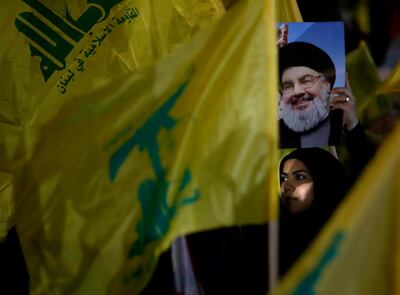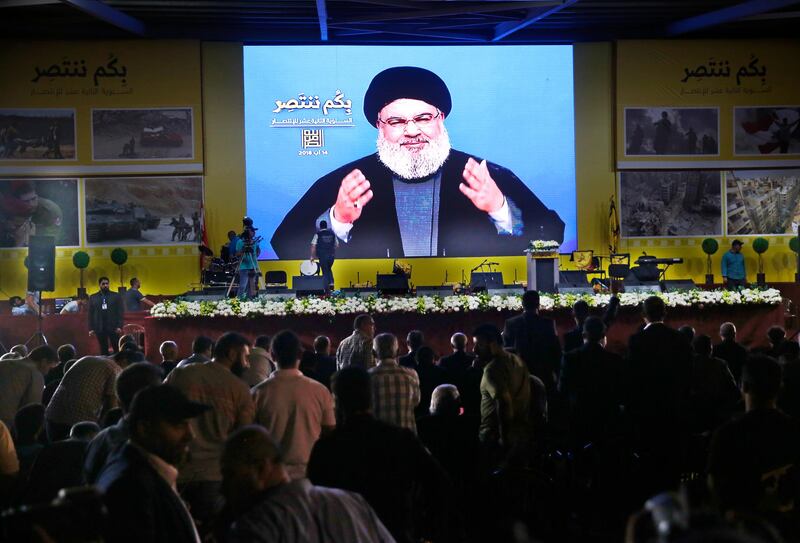Sayyed Hassan Nasrallah, the elusive leader of the Shiite militant group Hezbollah, appeared on big screens in southern Beirut Tuesday night to deliver a message to the party’s numerous supporters: we are stronger than ever.
While the leader of the militia-cum-political party is well known for his fiery televised speeches made from an undisclosed location, particularly when he marks the anniversary of the 2006 war, 12 years after the 34-day conflict he has a reason to rally his followers.
Nasrallah regularly weaves historical anecdotes into contemporary current affairs, leveraging stark moments in the history of the party and Shiism to hammer home a point about current policy. On Tuesday, the 2006 war provided that backdrop.
The timing of Nasrallah's appearance comes just days after fresh US sanctions were imposed on the Iranian economy after President Donald Trump withdrew Washington from the landmark nuclear deal with Iran. While the sanctions are aimed at Tehran, they will also impact its primary sponsor in Lebanon. Nasrallah's main takeaways from his latest appearance were strength and power projection.
There is little doubt that Hezbollah grew and morphed into a major force in the years following its birth during Lebanese civil war at the time of the Israeli occupation in the 1980s. Beating Israel out of Lebanon in 2000 after a bloody guerrilla campaign and then surviving the month long 2006 was a feat. But today, observers say it is more powerful politically and militarily than ever even as it faces major challenges.
_______________
Read more:
Israel strikes military post in Syria's Hama province
Saudi's UN envoy says Hezbollah aims to destabilise the region
_______________
“I see them a bit more cornered now than they were back in 2012-2013,” says Muhanad Hage Ali of the Carnegie Middle East Centre.
Nasrallah warned that any country that tried to take on the group would be doomed to failure. “No one scares us away from wars. Anyone who wants war: They’re welcome,” he said.
The intended audience of his speech was not only Hezbollah’s followers, but the wider international community – particularly the US and Israel, two of the most prominent opponents of the group and the Iranian regime.
As well as launching dozens of airstrikes against "high grage wepons shipments" destined for the group, Israel has carried out a string of assassinations against senior Hezbollah operatives, including those on Syrian soil where it is heavily engaged in support of its longstanding benefactor.
Israel has also threatened to launch attacks on the group and its allies in southern Syria if it threatens national security. But Hezbollah's primary concern at present is that its economic strength will be reversed by Mr Trump's sanctions and this speech can be viewed as a counter-narrative to that.
He downplayed the threat of sanctions, saying Iran had faced them since the 1979 revolution but remained powerful.
“I just see this as a particular moment in which they need to tell the world that we can hurt you, we can make a mess if we want to,” says Mr Hage Ali.
“I think the statement’s yesterday echo the statements that came out of Iran,” he adds, citing Tehran's threats to stop the flow of oil through the Strait of Hormuz.
While Hezbollah is on the back-foot internationally, on the ground in Lebanon and Syria it arguably has more might than ever.
The Iran-backed proxy has enough power in Lebanon to appear unthreatened by a splintered and ineffectual parliament where its allies busily push its agenda. May's parliamentary election saw it consolidate its influence at the heart of the country's political scene, while Sunni Prime Minister Saad Hariri's Future Movement was cut down to size.

Hezbollah has cleared the majority of the Lebanese-Syrian border of ISIS fighters, some of which was fought alongside the Lebanese army. Its political progress and counter-terrorism missions speak to its oft-repeated motto – the people, the army and the resistance – that seeks to paint them as a key protector of Lebanese sovereignty and a force woven into the country’s very fabric.
But it is on the battlefield where Hezbollah has truly developed since 2006. In an unparalleled shift for the group, it entered into the Syrian civil war in May 2013 on the side of longstanding ally President Bashar Al Assad. It offered the opportunity to bolster not only its weapons arsenal but expertise and ranks, too. An influx of Iranian funding and weapons transfers have seen its arsenal mushroom into the largest it has ever been.
In its possession before the 2006 war was estimated at just 33,000 rockets and missiles. This figure increased four-fold by the time the group was fully embroiled in the Syrian conflict. Its ranks soared from just a few thousand in 2006 to more than 20,000 less than a decade later. And crucially, many of those thousands are now battle-hardened from years of bloody fighting across the border.
Timor Goksel, former spokesperson and senior adviser for the United Nations peacekeeping force in Lebanon, says the group is now “more organised” after its entry into Syria.
Despite Nasrallah’s “typical” hyperbole, the group is now “more of a military-type organisation, rather than a militia,” said Mr Goksel, who now works with Al-Monitor news website. He agreed that this makes it indeed one of the most powerful fighting forces in the Middle East.
“It is a strong army in the region,” he says. “There are not too many organised militaries in the region, so [Nasrallah] is not totally off the mark”.
Hezbollah officials and fighters are “good students,” he adds, intensely examining the war with Israel to learn and prepare for the next round of conflict.
So, there is some credence to Nasrallah’s words. But his messages are always considered and spoken for a strategic reason, not solely to boast.
To that end, the bellicose show was ultimately a bid to raise morale among the group’s members, its backers in Tehran and to send a message to the US and its allies that the group remains a threat that cannot be ignored whatever the sanction.
As thousands gathered to hear his words, the shadowy Hezbollah chief had an ominous warning for Israel: “As we won the July War 2006, we shall also emerge victorious very soon.”





